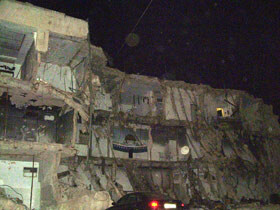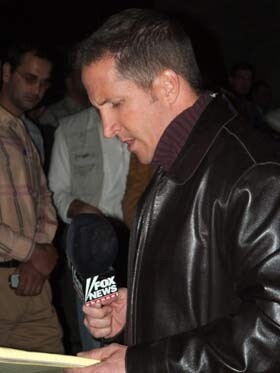
Inside the Muqata’a headquarters Thursday night (Maureen Clare Murphy)
As talking heads speculate the future after Arafat, and project the Israeli and Palestinian reactions to his looming death, Palestinian demonstrators and vigil-holders were notably absent from the Muqata’a last night. It was funny to observe journalists fruitlessly waiting for something interesting to happen at the Maqata’a, and then to see on TV when I got home that there were some 40 Palestinian sympathizers keeping vigil in front of the Paris hospital where Arafat is receiving treatment. My friends and I walked around Ramallah looking for some sign of vigil, but none were to be found.
Maybe people in Ramallah have enough death in their life to get too worked up about Arafat’s passing before it even happens. Or perhaps people are ready for a change, and whatever political instability that will occur after Arafat’s passing was bound to happen one day or another. As one Palestinian friend explained to me, Arafat remained in power even though the last election was an unacceptable eight years ago (and he contends that because Arafat was elected by West Bank and Gaza Palestinians only, he doesn’t truly represent the world’s 8 million Palestinians), because there has been no one to rise up with enough clout to challenge his authority, and the population feels disconnected from him.
Though the pressed-collared commentators on TV and the print pundits make grim predictions of chaos after Arafat’s death, it’s hard to imagine the population here, seemingly unfazed by the news of Arafat relying on life support, resorting to such.

A Fox News correspondent reporting from the Muqata’a (Maureen Clare Murphy)
The life-as-usual attitude prevalent here in Ramallah despite Arafat’s deteriorating health may be surprising to those around the world still reeling from Bush’s re-election in the U.S. (Though I did get a present from a shopkeeper today because I told him I hate Bush, the general attitude towards the Bush-Kerry contest was “same shit, different smell,” as an acquaintance put it. And most of the Palestinians I’ve talked to find that while Bush has completely mishandled the conflict and calls Israeli Prime Minister Ariel Sharon a “man of peace,” Kerry was bound to be as equally as bad when it comes to their issue.) Maybe it’s that Palestinians are likely to get a change that has been long put on hold. Too bad for Americans and the rest of the world a change for the somewhat-better didn’t come for us this week.
But Arafat’s impending death is not about Palestinians finally ridding themselves of his regime, as some in the Israeli press are putting it. A change in leadership has been inevitable for some time, and when it happens it will be dealt with. But for now, the only chanting and yelling happening in Ramallah is that of street vendors advertising their prices for produce and clothing in the downtown market. Even the journalists reporting from the Muqata’a last night have found their way to the market on Manara street, where they are curiously photographing the lambs’ heads and other goods for sale, along with the crowds making their purchases, because society at work is vastly more interesting to look at than the walls of Arafat’s headquarters.
Related Links
Maureen Clare Murphy, currently living and working in Ramallah, is Arts, Music, and Culture Editor for The Electronic Intifada.




